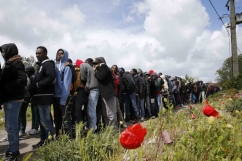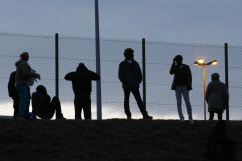More than 200 migrants are feared to have drowned in the lates tMediterranean boat tragedy after rescuers saved over 370 people from a capsized boat thought to be carrying 600, the Italian coast guard indicated on Thursday.
Rescue ships including vessels from the Italian and Irish navies and humanitarian agency Medecins sans Frontiers (MSF) recovered 25 bodies after the boat sank off the Libyan coast on Wednesday and found no more overnight, a spokesman said.
Initial reports put about 700 passengers on the overcrowded steel-hulled boat but interviews with survivors - mostly Syrians fleeing their country's civil war - reduced that estimate and the figure could still change.
Early on Thursday, another large migrant boat was spotted in the area, just 30 miles from the Libyan coast, and one of the Italian rescue ships was sent to its aid, the spokesman added.
The capsized boat flipped over on Wednesday as a rescue vessel approached, probably because desperate passengers surged to one side as they saw help arrive.
"We don't know how many people might be trapped within the belly of the boat that capsized and sunk, that's our greatest fear tonight," MSF, whose Dignity 1 rescue ship was on the scene, said in a Tweet late on Wednesday.
"People were clinging to life rafts, fighting for their lives," said MSF's Juan Matias, who was aboard Dignity 1.
The Mediterranean Sea has become the world's most deadly border area for migrants. More than 2,000 migrants and refugees have died so far this year in attempts to reach Europe by boat, compared with 3,279 deaths during the whole of last year, the International Organisation for Migration said on Tuesday.
The dynamic of Wednesday's tragedy was similar to an April shipwreck carrying up to 800 migrants.
That 20-metre (66-foot) vessel capsized as it approached a merchant ship that had come to its assistance, making it the deadliest shipwreck in the Mediterranean for decades and a symbol of Europe's long-running migrant crisis.
















